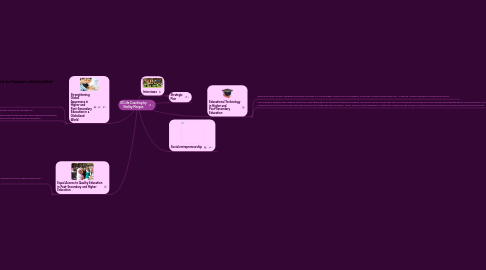
1. Strengthening Global Awareness in Higher and Post-Secondary Education in a Globalized World
1.1. Challenge # 2: Strengthening Cultural and Global Awareness in Higher and Post-Sec Education in a Globalized World. Examples of challenges that post-secondary institutions face could be: The Challenge of remaining global competitive and relevant Linguistic Depth (strengthening multilingual capabilities) Boosting Math, Engineering and Science
1.2. As it relates to the disabled student population, examples of challenges are: The challenge of overcoming certain cultural taboos/views regarding certain disabilities and disorders The challenge of building cultural awareness with in the disabled student population.
2. Educational Technology in Higher and Post-Secondary Education
2.1. With such a rapidly and ever-changing technological landscape, it is and will always continue to be a challenge for universities, colleges, training centers etc... to keep up. Certain challenges on a larger scale could be.
2.2. The challenge of keeping balance between integration of new technologies and distraction/cluttering the student. The influx of numerous technology and social media platforms should be experimented with and integrated into the classroom but not at the price of cluttering the focus of the students to the point where they become too distracted to learn. Disabled students of course will need to have equal access to these technologies and innovations as well. Therefore certain challenges for institutions of higher learning could be: The challenge of implementing and providing adequate adaptive technology
3. Equal Access to Quality Education in Post-Secondary and Higher Education
3.1. Area #1: Access to Financial Resources. Area #2: Access to Academic Support. Area #3: Social Access (e.g. Social Inclusion, providing inclusive community services in higher education etc..). Area #4: Access to Technology, Services and Facilities.
4. Interviews
4.1. Lance Harrop, Director Disablity Resources, ASU Downtown campus KC, IIC Participant Barbra, IIC Parent Denice Gallagher, IIC Life Coach Miaka Golden, (Friend ) Linguist
4.1.1. The people I interviewed all have a investment in seeing a program like life coaching be successful. The first Lance Harrop, Assistant Director of Disablity, Downtown Campus. He during the interview stated that it was important for ASU students and others to be able to gain access to a equatable education despite their disablity. He thinks that life coaching services for students is a good way to provide students with ono to one supports outside of the DRC. KC, a participant stated that they began to need life coaching when they found themselves in crisis and needed to support to gain perspective about their goals. Barbra , the IIC parent states that their has been a positive change in her daughter through life coaching. In her testimonial she states the life coach working with her daughter has been a campanion, teacher and friend, all the while help to facilitate her daughter reaching her goals. Denice Gallagher stated that being a life coach is important because she is actively helping to changing peoples lives. For example, she stated that the one of the people she works with has begun to advocate on their own behalf and this is a vast change from when they started the program. Lastly, the person I trust is my friend and fellow student, interested in teaching. Miaka states that thier has been a positive change in me from the time I started life coaching. She stated that how I approach people has changed, that I am now one to offer solutions to issue and am now more likely to speack up.
